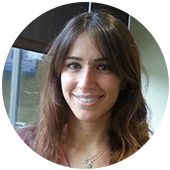05/11/2016
My 'Big Brother' Itamar's Story
- Share This Story
By Danielle Asif
Shlicha (Israeli Emissary)
Late in the afternoon on October 13th, 1998 my parents called me and my older sister into our family room. My father said: “something has happened. Itamar was murdered.” This was the first time I had ever heard the word ‘murdered’ in proximity to the name of someone close to me.”

My father was the 6th out of 9 children and he had 37 nieces and nephews, but one of those 37 was definitely his favorite. The two of them were very close and it seemed like my father thought of Itamar as his own son. To me and my sister, it seemed that Itamar truly was our ‘older brother.’
After 3 years of service in the IDF, Itamar began to work with my father in the family business. When Itamar was 23 years old, during the Sukkot holiday in 1997, he began to find a path of return to the religious observance of Orthodox Judaism. He began to grow a beard and ‘peot’-sidelocks, to observe Shabbat, and to pray several times a day.
Outside of Jerusalem, near Ora, the Moshav where Itamar’s family lives, there is a water spring that is considered ‘holy’ by the Chasidim that was called ‘Ora’s spring.’ It was in these holy spring waters that Itamar would go daily to purify himself. On that fateful October morning at around 11:00 a.m. Itamar and his friend Ilan arrived at ‘Ora’s spring’ for their daily ritual. Itamar parked the car close to the water and left the keys in the ignition. They took off their clothes and entered the spring’s holy water.
Neither Itamar nor Ilan realized that in these moments they were being watched by two people in the nearby bushes. After a few moments two strangers stepped out of the bushes, said hello to them and asked them: “Are the keys in the car?” Itamar and Ilan responded by saying that they were, and at that point one of the strangers pulled out a gun and shot them several times at close range. The water in the spring quickly turned red and Itamar was dead in moments. Immediately, the second terrorist jumped on Itamar and stabbed him numerous times to eliminate any small chance he might have had to survive, as fate would have it, neither terrorist was able to confirm that Ilan was dead before they both ran to Itamar’s car and escaped to a nearby Palestinian village.
Ilan pretended to be dead in the water. After the terrorists escaped he crawled out of the spring and screamed for help. He couldn’t move because he was seriously wounded.
My father told me that right around the time it happened, when he was parking his car outside of our home, he suddenly experienced a very sharp pain in his chest. Only after he entered our house and saw the news flash on TV about the deadly terrorist attack in Ora did he understand that it must have been someone in our family who had been murdered. A few minutes later, his sister Sarah, Itamar’s mother, called to inform him.
This tragedy occurred at the end of Sukkot 1998. It means that Itamar had lived a religiously observant life for exactly one year. He was murdered by terrorists when he was 24 years old, only a month before he was to get married. Instead of a wedding, there was to be a funeral.
I remember going to their home for the ‘Shiva’- the ritual visits of mourning-every day after Itamar’s funeral and each time there were huge crowds in the house, but there was a frightening silence. When my sister and I went into Itamar’s bedroom we saw that everything remained exactly as he had left it the last time he was there. Even his bed remained ‘unmade’.
Itamar’s room and bed remained unmade and untouched for several years. His parents simply were not able to touch anything. It was as if they were waiting for him to return to his ‘messy’ room and slide back into that bed that he had left ‘unmade’ on the last day of his life.
My Aunt Sarah showed us a wooden board where Itamar would carve Jewish-themed quotes and drawings. His whole ‘story’ was told by what he had chosen to put on it. Among the quotes we saw, was one Itamar had written himself: “God’s wishes are my wishes”.
After his death the name of that holy spring was changed to “Itamar’s spring”. His family built a beautiful greenhouse near the spring where flowers and plants are grown and in the middle of all this beauty they opened a restaurant “Café Itamar,” and that’s where we celebrated the bar mitzvah of my little brother in 2008.
Itamar would be 42 years old today and I will always remember him as the ‘big brother’ who taught me how to garden and to strive to be victorious in every game.
I’ll conclude the story of my dear cousin by sharing a short but powerful poem written by the Israeli poet Chaim Chefer entitled “Tchilah Bochim.’
At first you cry,
Then the tears dry
Then you remember only one thing
The death of the son.
And you do not say anything,
or talk about the rain and what is going on.
And talk about something else, or other things.
And the ears would not hear anyway
And you remain silent
And you get up from the chair. And you sit
And get up. And sit again
And you know one thing
He will not return.

